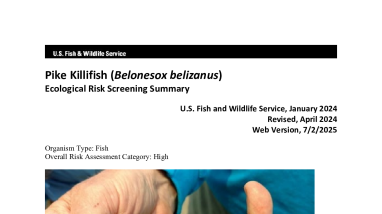Species that are considered high risk have a well-documented history of invasiveness in at least one location globally and are of establishment concern for the contiguous United States based on a climate matching analysis.
Belonesox belizanus, Pike Killifish, is a small euryhaline fish species native to the Atlantic drainages of Mexico and Central America. It is available in the aquarium trade, although its possession is regulated in several states. B. belizanus is mainly piscivorous, but it capable of consuming a variety of prey. Currently, this species is only established in Florida, but the species was present for a short time in Texas. Pathways of introduction include fish farm escape and deliberate release from captivity. The History of Invasiveness for Belonesox belizanus is classified as High due to its successful establishment within the state of Florida and documented negative impacts of its presence there including reductions in abundance of native fish species. The climate matching analysis for the contiguous United States indicates establishment concern for Belonesox belizanus. Climate match was highest in Florida and coastal Texas. The Certainty of Assessment for this ERSS is classified as High due to availability of general information and clear, documented negative impacts of introduction of this species reported in scientific literature. The Overall Risk Assessment Category for Belonesox belizanus in the contiguous United States is High.



